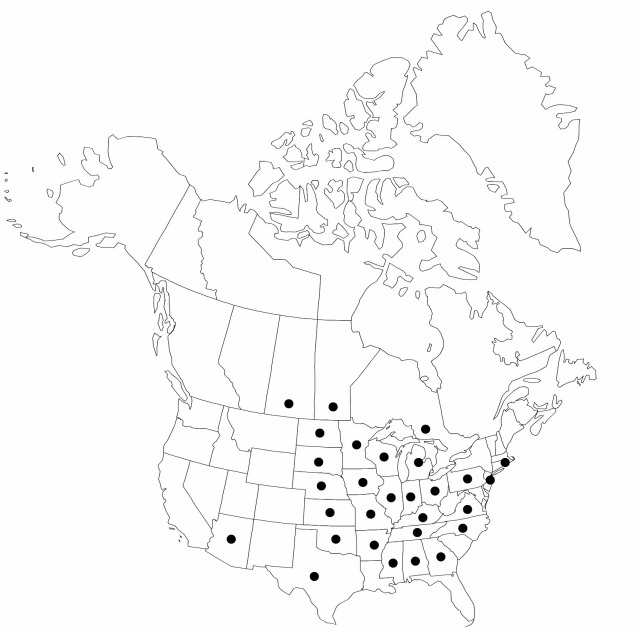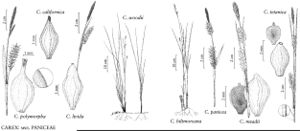Carex meadii
Amer. J. Sci. Arts 43: 90, plate Cc, fig. 94. 1842.
Plants colonial, long-rhizomatous, vegetative shoots widely scattered and inconspicuous from deep rhizomes. Culms 15–60 cm, usually scabrous distally. Leaves: proximal sheaths with blades, brownish, 1.5–5 mm diam.; ligules 0.4–3.6 mm, 0.4–1.2 times wider than long; blades gray-green, flat, 7–15 cm × 2–5(–7) mm, folded near bases, margins often revolute, herbaceous. Inflorescences 4–25 cm, 1–1.6 times as long as proximal bracts; proximal bract 2.5–20 cm, sheath 0.5–4 cm, blade 2–16 cm; pistillate spikes ovoid to cylindric, 6–37 × 3.5–8 mm; lateral spikes erect or ascending on stiff peduncles. Pistillate scales purple tinged or brown, apex awned or obtuse. Perigynia ascending to spreading, densely arranged, yellow-green to brown, 2.3–5 × 1.25–2.5 mm, minutely papillose; beak minute, bent. Achenes light to dark brown, 2.7–4 × 1.7–2.2(–2.5) mm.
Phenology: Fruiting late spring–early summer.
Habitat: Calcareous prairies, fens, cedar glades, open woodlands, moist depressions
Elevation: 50–2400 m
Distribution

Man., Ont., Sask., Ala., Ark., Ariz., Ga., Ill., Ind., Iowa, Kans., Ky., Mich., Minn., Miss., Mo., Nebr., N.J., N.C., N.Dak., Ohio, Okla., Pa., R.I., S.Dak., Tenn., Tex., Va., Wis., Mexico.
Discussion
Separating Carex meadii and C. tetanica can be problematic, particularly in the Great Lakes region where they seem to integrade with each other. Carex meadii, the more wide-ranging taxon, can tolerate drier habitats. In addition to the characters in the key, C. meadii tends to be a coarser plant with more grayish green leaves, shorter peduncles (bearing the staminate and proximal pistillate spikes), and thicker spikes. The perigynia, including the proximal ones, are strongly aggregated and borne in more ranks within the spike. Also, the beaks of C. meadii may be more distinct and sharply curved.
Due to confusion with Carex meadii, the geographic range of C. tetanica is not fully known.
Selected References
None.
